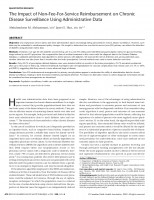Download
| File Size | 92.7 KiB |
|---|---|
| Date | August 31, 2013 |
| Downloads | 0 |
ABSTRACT
Objective: Use of physician service claims and other administrative data is increasingly being advocated for chronic disease surveillance. However, such data may be vulnerable to reimbursement policy changes. We sought to determine how non-fee-for-service (non-FFS) primary care affects the detection of diabetes using physician claims data.
Methods: Ontarians over age 66 with diabetes and receiving care in a non-FFS setting were identified using prescription claims for glucose-lowering drugs written by non-FFS physicians. We compared the date of incident treatment in this cohort with the diagnosis date in the Ontario Diabetes Database, a validated administrative data algorithm to detect persons with diabetes. We assessed the rate of detection and, among detected cases, whether detection was late (more than 6 months after the index prescription). Survival methods were used to assess detection over time.
Results: Only 49.7% of prescription-defined diabetes cases were detected within six months of the index prescription; 23.7% remained undetected after up to nine years of follow-up. Detected individuals had higher rates of hospitalization for vascular complications than missed cases (15.1% vs 4.8%, p
Objective: Use of physician service claims and other administrative data is increasingly being advocated for chronic disease surveillance. However, such data may be vulnerable to reimbursement policy changes. We sought to determine how non-fee-for-service (non-FFS) primary care affects the detection of diabetes using physician claims data.
Methods: Ontarians over age 66 with diabetes and receiving care in a non-FFS setting were identified using prescription claims for glucose-lowering drugs written by non-FFS physicians. We compared the date of incident treatment in this cohort with the diagnosis date in the Ontario Diabetes Database, a validated administrative data algorithm to detect persons with diabetes. We assessed the rate of detection and, among detected cases, whether detection was late (more than 6 months after the index prescription). Survival methods were used to assess detection over time.
Results: Only 49.7% of prescription-defined diabetes cases were detected within six months of the index prescription; 23.7% remained undetected after up to nine years of follow-up. Detected individuals had higher rates of hospitalization for vascular complications than missed cases (15.1% vs 4.8%, p



